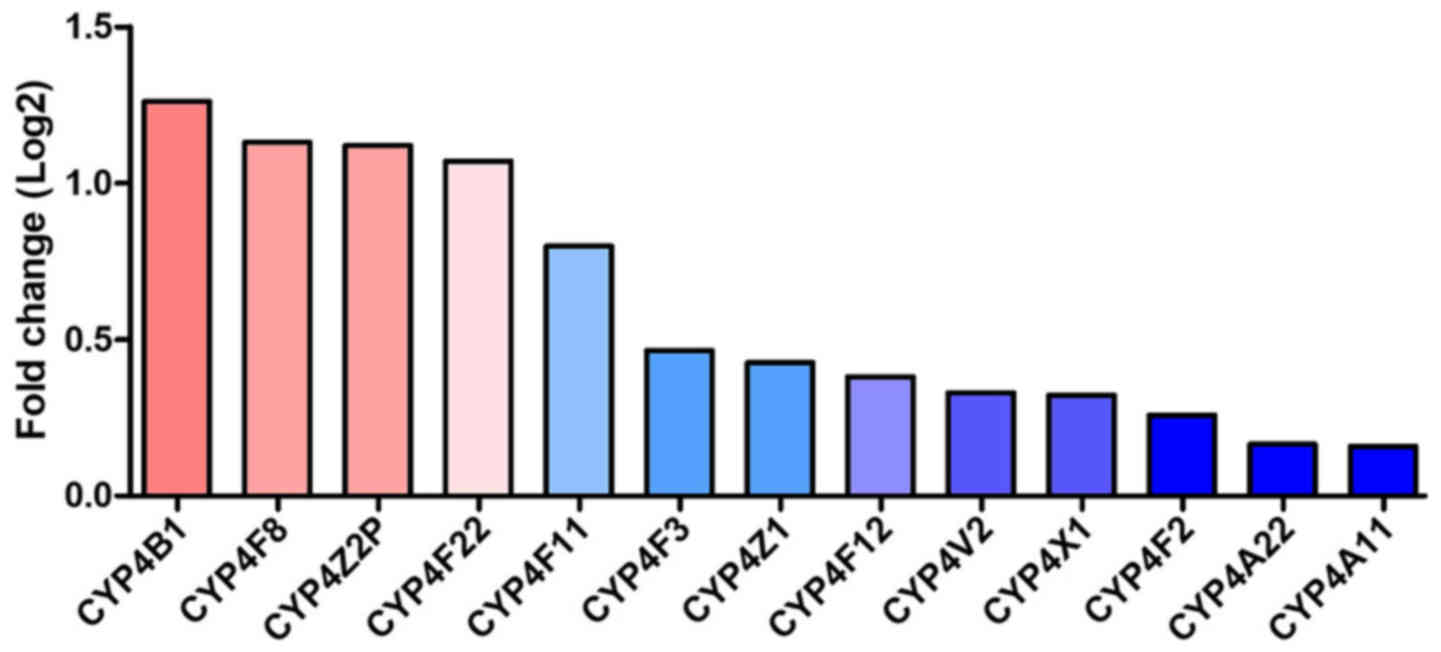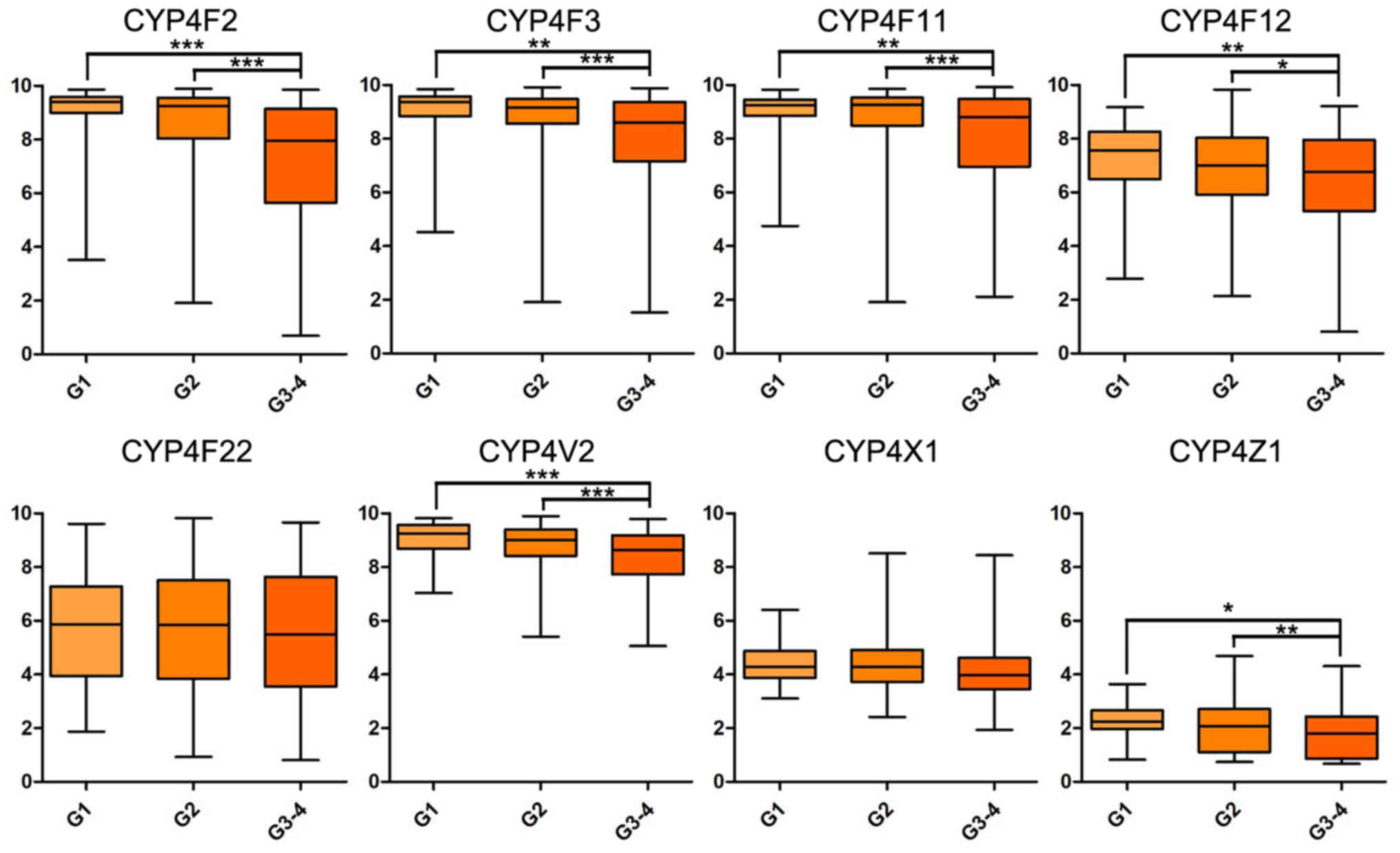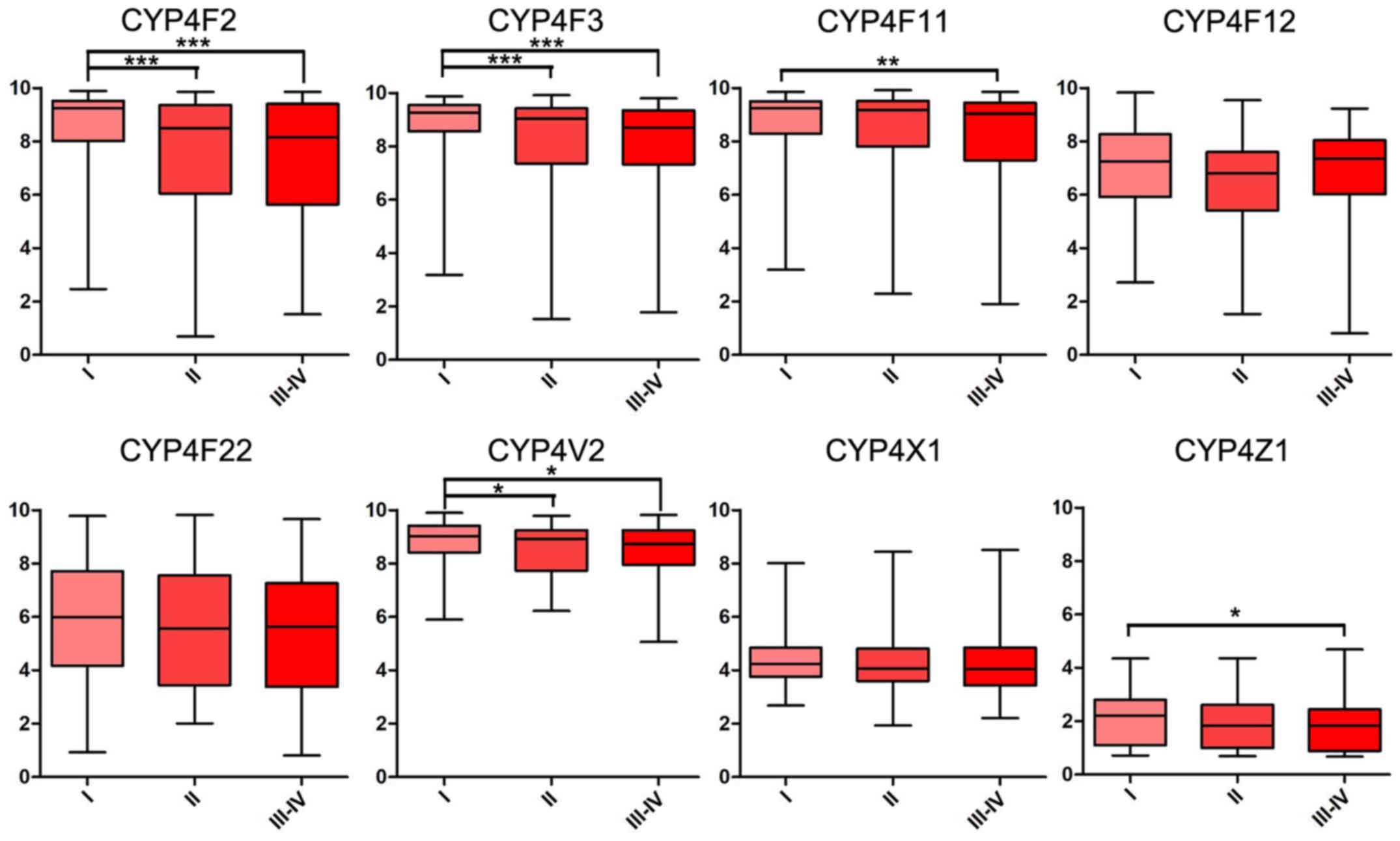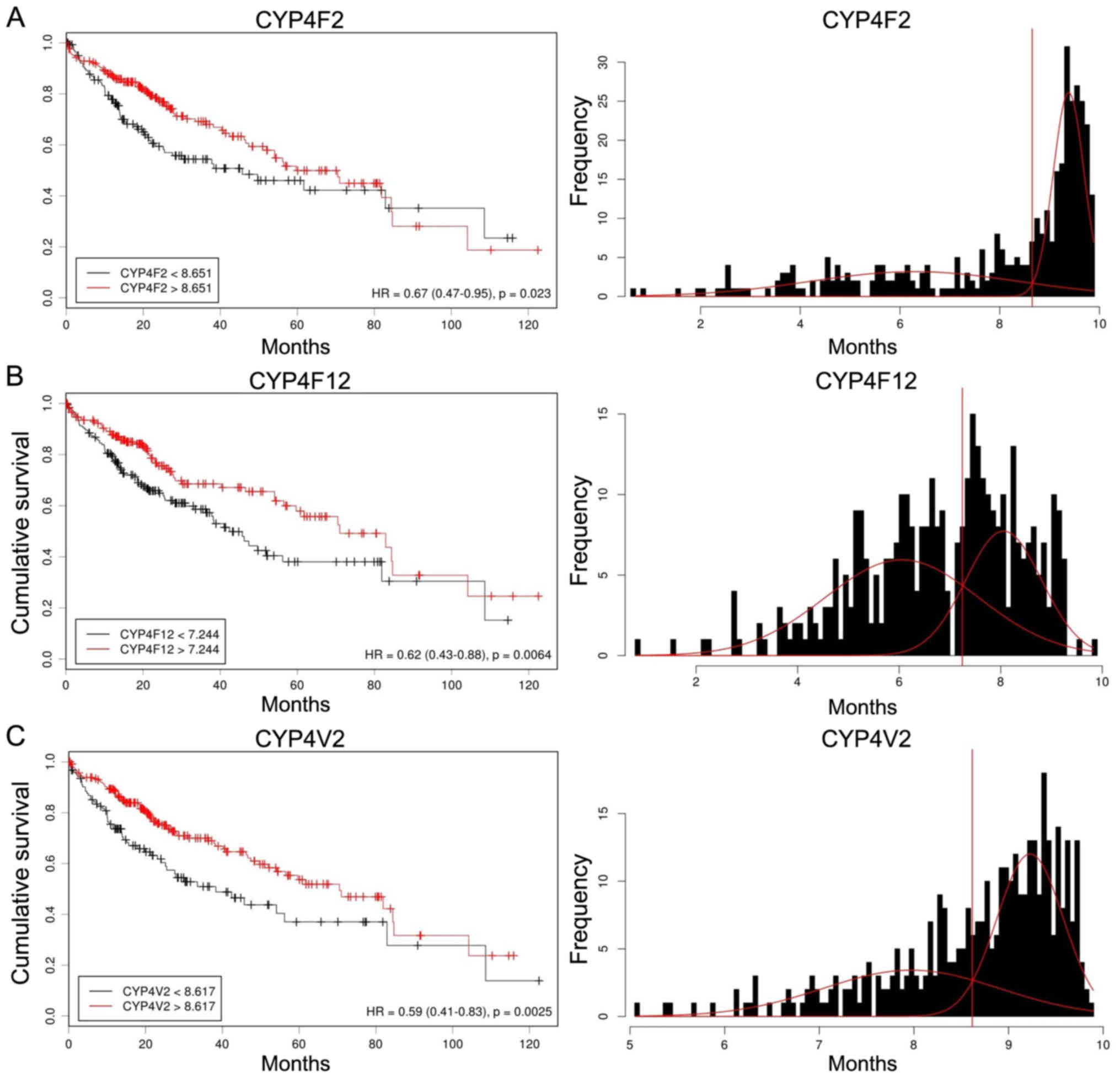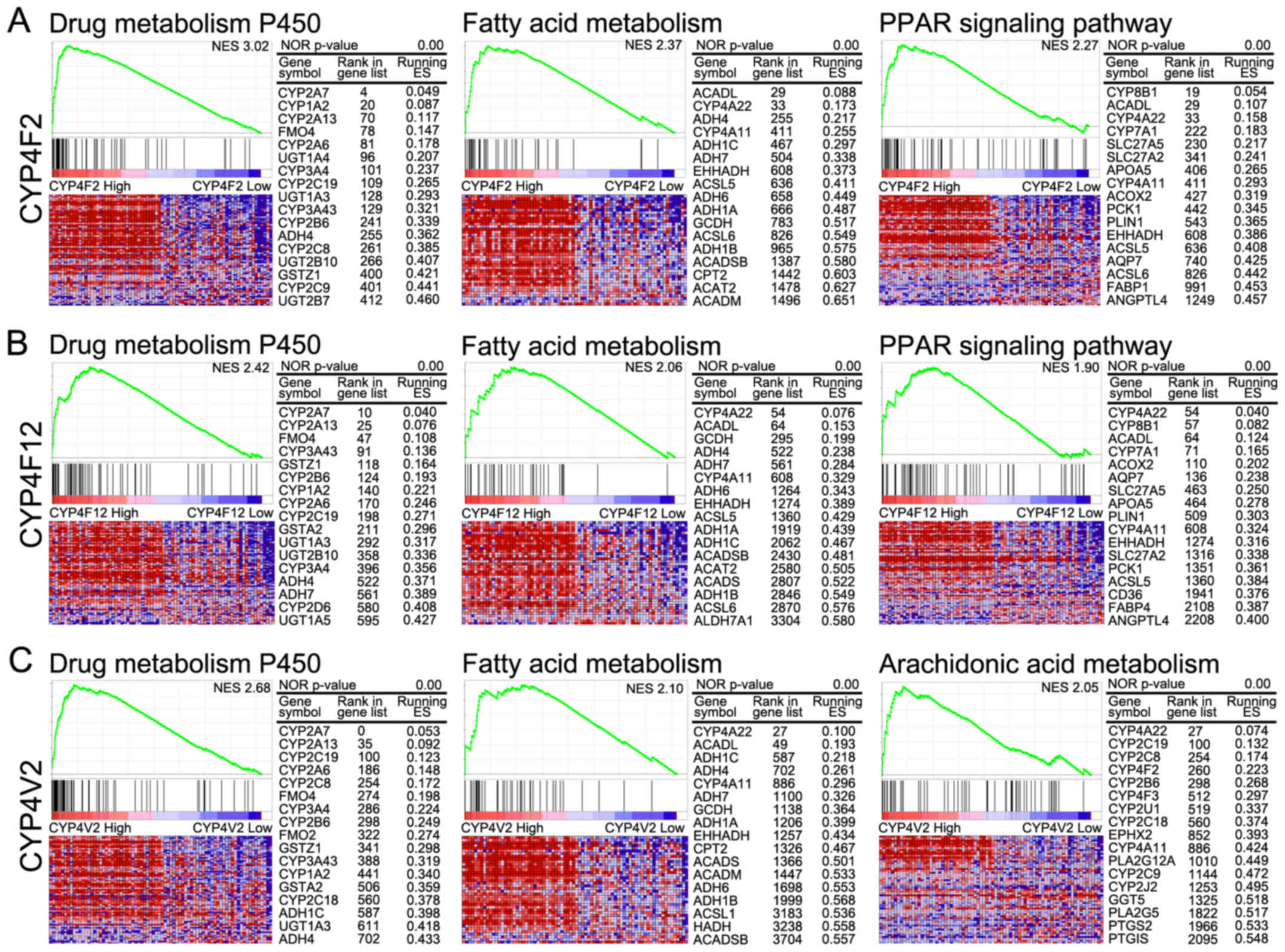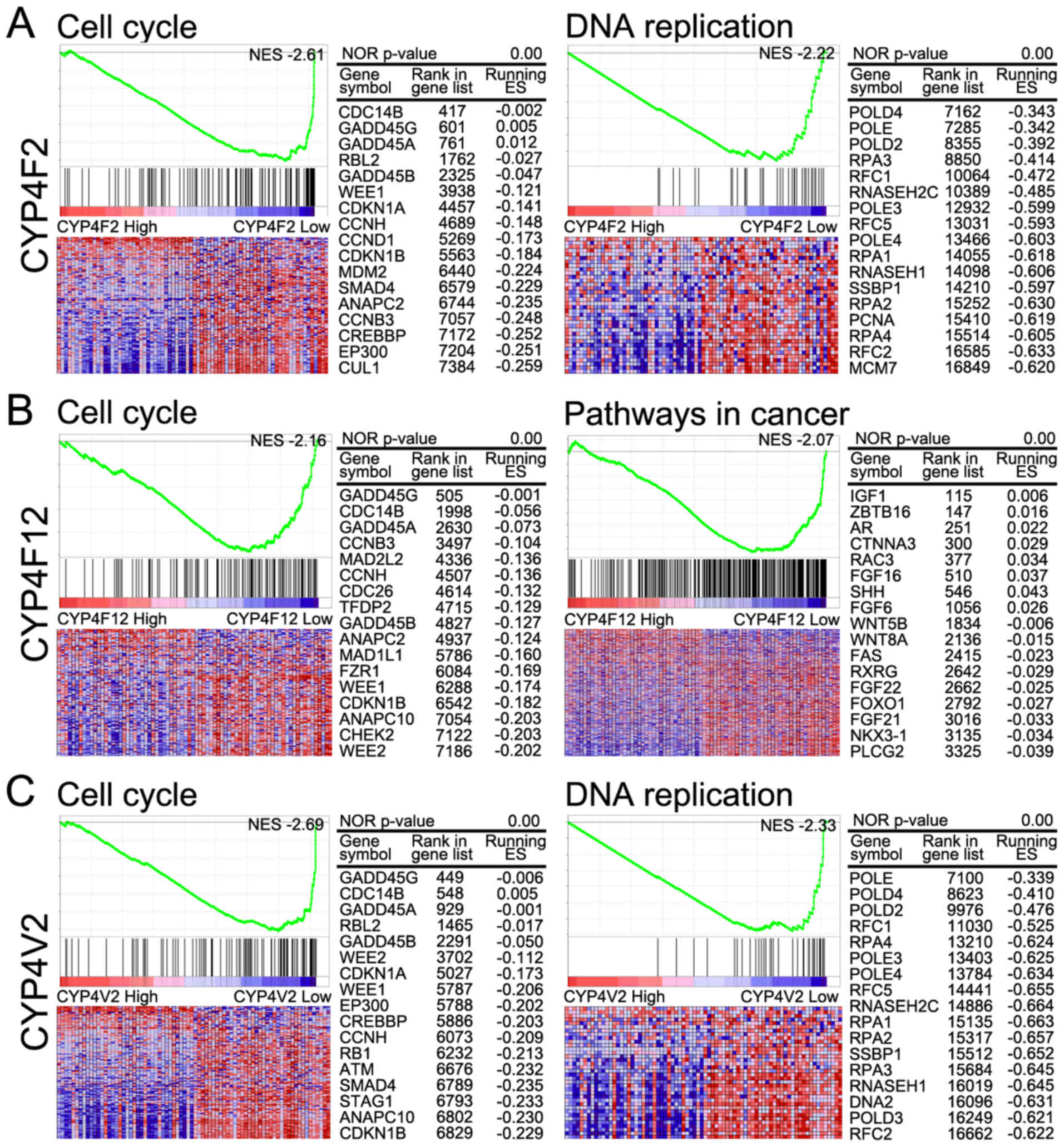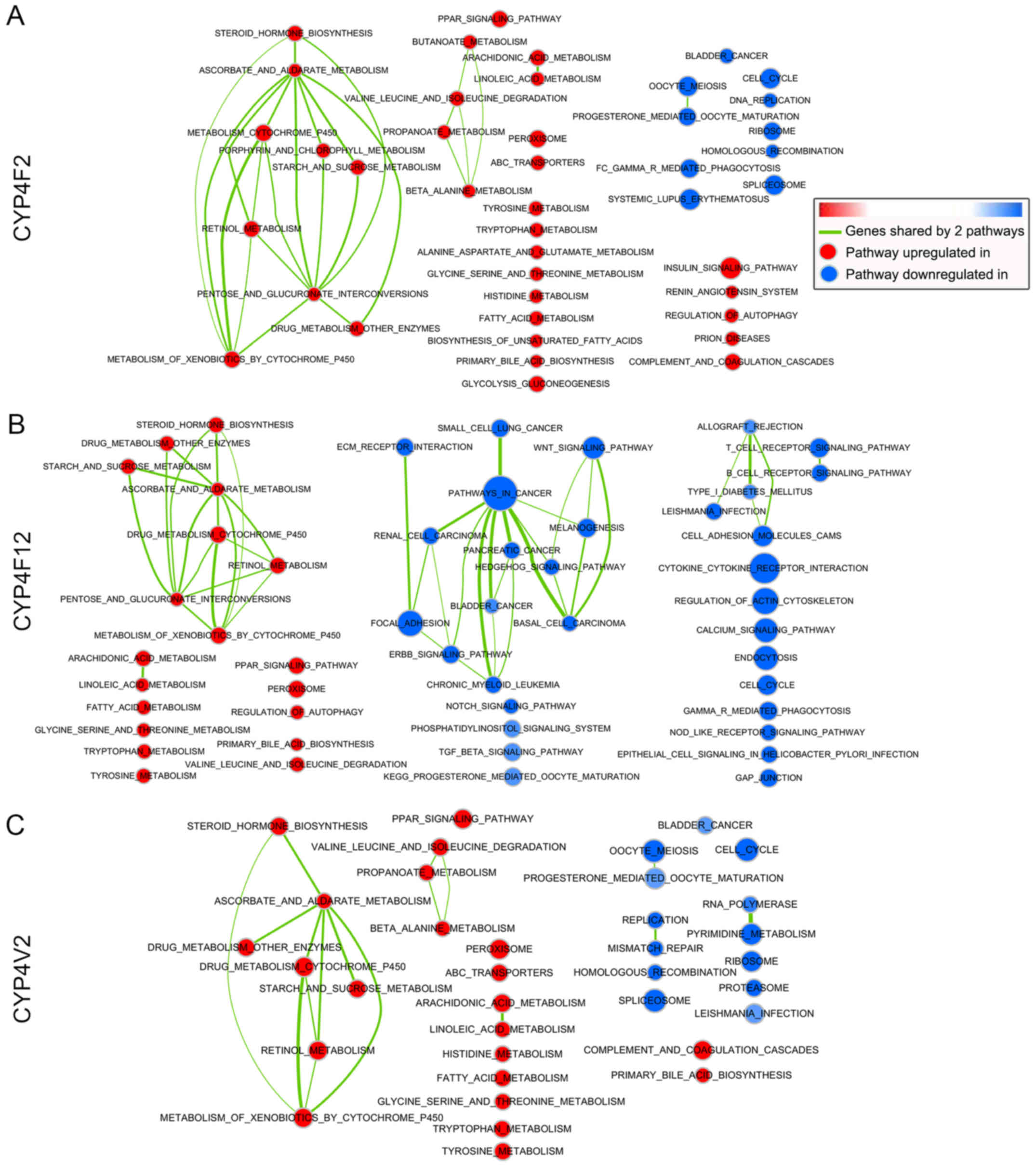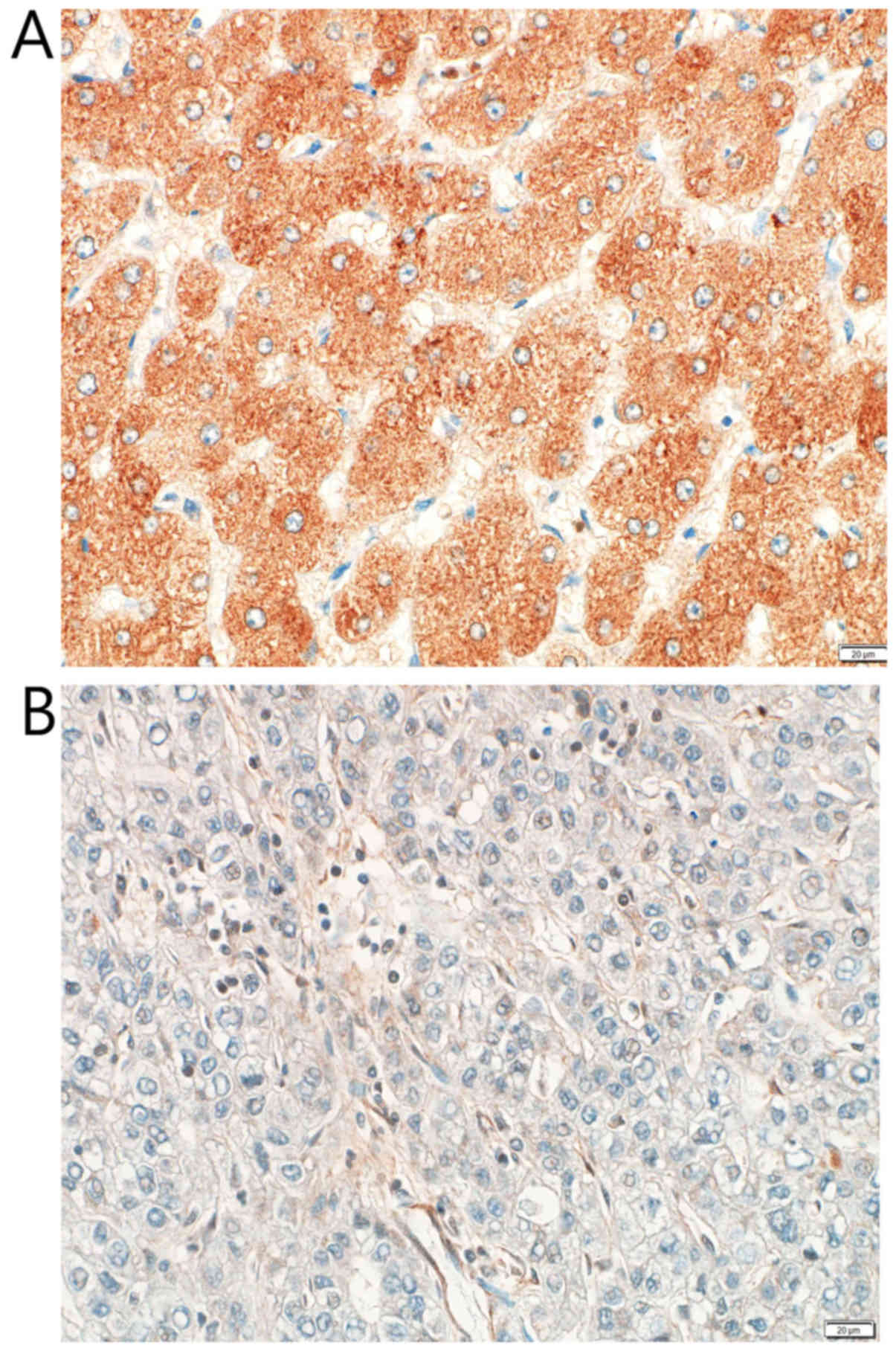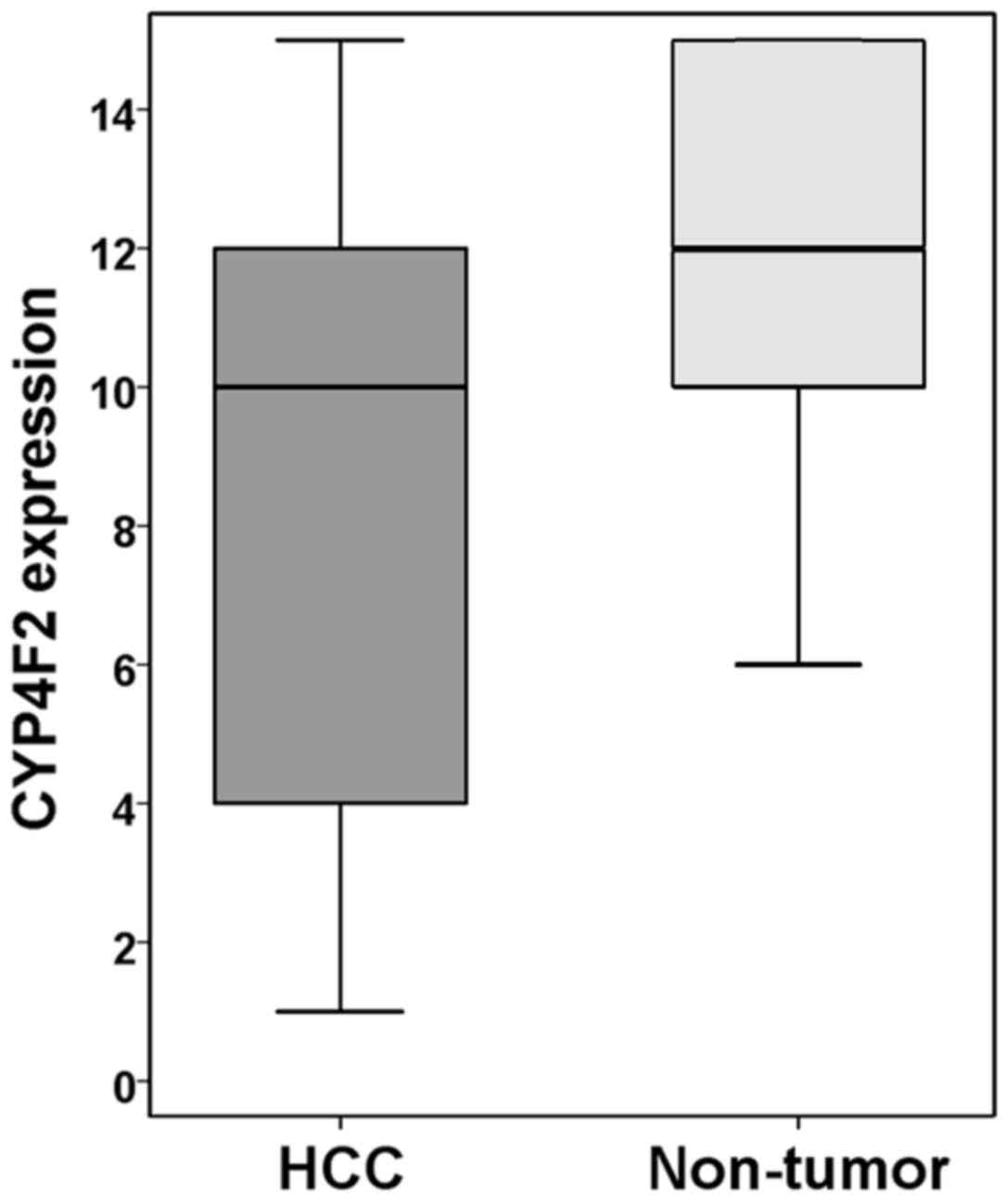|
1
|
Murray GI: The role of cytochrome P450 in
tumour development and progression and its potentil in therapy. J
Pathol. 192:419–426. 2000. View Article : Google Scholar : PubMed/NCBI
|
|
2
|
Murray GI, Patimalla S, Stewart KN, Miller
ID and Heys SD: Profiling the expression of cytochrome P450 in
breast cancer. Histopathology. 57:202–211. 2010. View Article : Google Scholar : PubMed/NCBI
|
|
3
|
Mackay DS and Halford S: Focus on
molecules: Cytochrome P450 family 4, subfamily V, polypeptide 2
(CYP4V2). Exp Eye Res. 102:111–112. 2012. View Article : Google Scholar : PubMed/NCBI
|
|
4
|
Nelson DR: The cytochrome p450 homepage.
Hum Genomics. 4:59–65. 2009.PubMed/NCBI
|
|
5
|
Hardwick JP: Cytochrome P450 omega
hydroxylase (CYP4) function in fatty acid metabolism and metabolic
diseases. Biochem Pharmacol. 75:2263–2275. 2008. View Article : Google Scholar : PubMed/NCBI
|
|
6
|
Hsu MH, Savas U, Griffin KJ and Johnson
EF: Human cytochrome p450 family 4 enzymes: Function, genetic
variation and regulation. Drug Metab Rev. 39:515–538. 2007.
View Article : Google Scholar : PubMed/NCBI
|
|
7
|
Kirischian NL and Wilson JY: Phylogenetic
and functional analyses of the cytochrome P450 family 4. Mol
Phylogenet Evol. 62:458–471. 2012. View Article : Google Scholar : PubMed/NCBI
|
|
8
|
Alexanian A, Miller B, Roman RJ and
Sorokin A: 20-HETE-producing enzymes are up-regulated in human
cancers. Cancer Genom Proteom. 9:163–169. 2012.
|
|
9
|
Johnson AL, Edson KZ, Totah RA and Rettie
AE: Cytochrome P450 ω-Hydroxylases in inflammation and cancer. Adv
Pharmacol. 74:223–262. 2015. View Article : Google Scholar : PubMed/NCBI
|
|
10
|
Ciriello G, Gatza ML, Beck AH, Wilkerson
MD, Rhie SK, Pastore A, Zhang H, McLellan M, Yau C, Kandoth C, et
al: Comprehensive molecular portraits of invasive lobular breast
cancer. Cell. 163:506–519. 2015. View Article : Google Scholar : PubMed/NCBI
|
|
11
|
Budczies J, Klauschen F, Sinn BV, Győrffy
B, Schmitt WD, Darb-Esfahani S and Denkert C: Cutoff Finder: A
comprehensive and straightforward Web application enabling rapid
biomarker cutoff optimization. PLoS One. 7:e518622012. View Article : Google Scholar : PubMed/NCBI
|
|
12
|
Yeo MK, Lee YM, Seong IO, Choi SY, Suh KS,
Song KS, Lee CS, Kim JM and Kim KH: Up-regulation of cytoplasmic
CD24 expression is associated with malignant transformation but
favorable prognosis of colorectal adenocarcinoma. Anticancer Res.
36:6593–6598. 2016. View Article : Google Scholar : PubMed/NCBI
|
|
13
|
Allred DC, Harvey JM, Berardo M and Clark
GM: Prognostic and predictive factors in breast cancer by
immunohistochemical analysis. Mod Pathol. 11:155–168.
1998.PubMed/NCBI
|
|
14
|
Amin MB, Edge S, Greene F, Byrd DR,
Brookland RK, Washington MK, Gershenwald JE, Compton CC, Hess KR,
Sullivan DC, et al: AJCC cancer staging manual. Eighth edition.
Chicago, IL: Springer; 2017, View Article : Google Scholar
|
|
15
|
Bosman FT, Carneiro F, Hruban RH and
Theise ND: WHO classification of tumours of the digestive system.
4th edition. Lyon: IARC; 2010
|
|
16
|
Kalsotra A and Strobel HW: Cytochrome P450
4F subfamily: At the crossroads of eicosanoid and drug metabolism.
Pharmacol Ther. 112:589–611. 2006. View Article : Google Scholar : PubMed/NCBI
|
|
17
|
Cui X, Kawashima H, Barclay TB, Peters JM,
Gonzalez FJ, Morgan ET and Strobel HW: Molecular cloning and
regulation of expression of two novel mouse CYP4F genes: Expression
in peroxisome proliferator-activated receptor alpha-deficient mice
upon lipopolysaccharide and clofibrate challenges. J Pharmacol Exp
Ther. 296:542–550. 2001.PubMed/NCBI
|
|
18
|
Kalsotra A, Turman CM, Kikuta Y and
Strobel HW: Expression and characterization of human cytochrome
P450 4F11: Putative role in the metabolism of therapeutic drugs and
eicosanoids. Toxicol Appl Pharmacol. 199:295–304. 2004. View Article : Google Scholar : PubMed/NCBI
|
|
19
|
Bylund J, Hidestrand M, Ingelman-Sundberg
M and Oliw EH: Identification of CYP4F8 in human seminal vesicles
as a prominent 19-hydroxylase of prostaglandin endoperoxides. J
Biol Chem. 275:21844–21849. 2000. View Article : Google Scholar : PubMed/NCBI
|
|
20
|
Tsunedomi R, Iizuka N, Hamamoto Y,
Uchimura S, Miyamoto T, Tamesa T, Okada T, Takemoto N, Takashima M,
Sakamoto K, et al: Patterns of expression of cytochrome P450 genes
in progression of hepatitis C virus-associated hepatocellular
carcinoma. Int J Oncol. 27:661–667. 2005.PubMed/NCBI
|
|
21
|
Nakano M, Kelly EJ, Wiek C, Hanenberg H
and Rettie AE: CYP4V2 in Bietti's crystalline dystrophy: Ocular
localization, metabolism of ω-3-polyunsaturated fatty acids, and
functional deficit of the p.H331P variant. Mol Pharmacol.
82:679–686. 2012. View Article : Google Scholar : PubMed/NCBI
|
|
22
|
Yi M, Shin JG and Lee SJ: Expression of
CYP4V2 in human THP1 macrophages and its transcriptional regulation
by peroxisome proliferator-activated receptor gamma. Toxicol Appl
Pharmacol. 330:100–106. 2017. View Article : Google Scholar : PubMed/NCBI
|
|
23
|
Shi Y, Steppi A, Cao Y, Wang J, He MM, Li
L and Zhang J: Integrative comparison of mRNA expression patterns
in breast cancers from Caucasian and Asian Americans with
implications for precision medicine. Cancer Res. 77:423–433. 2017.
View Article : Google Scholar : PubMed/NCBI
|
|
24
|
Marquardt JU, Fischer K, Baus K, Kashyap
A, Ma S, Krupp M, Linke M, Teufel A, Zechner U, Strand D, et al:
SIRT6 dependent genetic and epigenetic alterations are associated
with poor clinical outcome in HCC patients. Hepatology.
58:1054–1064. 2013. View Article : Google Scholar : PubMed/NCBI
|
|
25
|
Takigawa Y and Brown AM: Wnt signaling in
liver cancer. Curr Drug Targets. 9:1013–1024. 2008. View Article : Google Scholar : PubMed/NCBI
|















